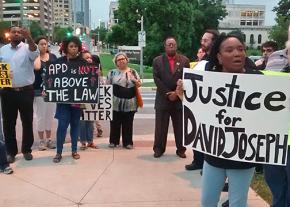Why did David Joseph’s killer go free?
reports on the response of activists in Austin, Texas, to a grand jury decision not to indict the police officer who killed 17-year-old David Joseph.
A SMALL, somber crowd gathered in Austin, Texas, May 18 to respond to the news that David Joseph's murderer, Officer Geoffrey Freeman, would not be indicted on criminal charges.
Joseph was killed by Freeman in a North Austin suburb this February. At the time of his death, the 17-year-old was unarmed and naked. Immediately after his death, the Austin Police Department (APD) smeared Joseph by suggesting he had taken PCP, a claim that was later disproven.
The Austin Justice Coalition (AJC) and Austin chapter of Black Lives Matter (BLM) have organized activism around the case, holding multiple rallies and issuing a series of demands that included firing Freeman.
Throughout, Police Chief Art Acevedo has sought to portray himself as sympathetic to the activists' demands. He held a press conference with AJC and BLM leaders by his side, and ultimately fired Officer Freeman.
According to Chief Acevedo, he fired Freeman because his handling of the situation "was not objectively reasonable and not in accordance with standardized policy and training." In his disciplinary memo, Acevedo specifically criticized Freeman for not waiting for backup that was already on its way and for using deadly force when other means were available.

Unsurprisingly, Acevedo's decision prompted a backlash from the Austin Police Association, whose president went so far as to blame Joseph's death on police understaffing. This in a city that allocates around 40 percent of its general fund to the police department.
In response to pressure from the association, the city manager punished Acevedo for appearing with the activists, docking him five days' pay.
IN DETERMINING whether or not Freeman would face criminal charges, the District Attorney followed standard practice, convening a grand jury that hears the police version of events at great length before issuing a supposedly "impartial" decision. This fraught process was brought under greater scrutiny by the BLM movement.
Just before the grand jury was to release its decision, the APD finally released its video of the shooting. While police supporters pointed to the fact that Joseph disobeyed Freeman's orders and ran toward him, the basic facts remain unchanged: Joseph was unarmed and naked; Freeman approached him alone and exited his vehicle immediately, rather than waiting for backup; and Freeman used deadly force when other options were available. Furthermore, although the shooting occurs off-camera, it appears as though Joseph begins to veer away from Freeman before the shots were fired.
On May 17, the grand jury's decision that it would not indict Freeman was announced. Jeff Edwards, an attorney for the Joseph family, responded:
Failing to secure an indictment when a police officer shoots and kills an unarmed skinny, naked teenager, who the officer outweighed by over 100 pounds, is a failure of will by the District Attorney, and calls into question the entire grand jury process in cases involving police misconduct.
Adding insult to injury, there is now speculation that Officer Freeman may even receive his job back.
THE FOLLOWING day, activists gathered on a cloudy evening outside the Travis County Justice Complex, where they formed a circle and held a speak-out.
Many speakers were audibly anguished. Some suggested a strategy of doubling down and contacting political representatives more fervently and consistently. Others, however, expressed disillusionment with Austin's officials and official methods of redress.
"I thought that because we were up there with the chief, because we were up there with City Council, because we fought and this man was fired, that possibly we may see some kind of justice happen," said Meme Styles of Measure Austin. "That's what I thought, but I lost a little hope yesterday."
Juanita Spears of the Austin Justice Coalition reminded everyone, "It doesn't matter what color a police officer is. He's still a blue; he's on the blue team. And the blue's gonna stand up for the blue. That's why the people need to stand up for the people."
One activist's speech broke down at one point, as he simply asked, "What do we do?...What do we do now?"
In the face of yet another failure by the system to provide any measure of justice for Black, working-class lives, the answer remains what it has always been: Struggle.
As Mike, a member of the International Socialist Organization, pointed out to the crowd, "Our power is not in our friends in high places. It's all of us here standing together in greater and greater numbers."


